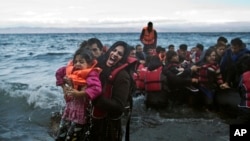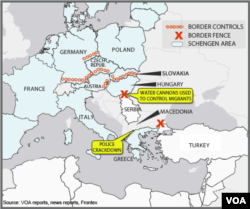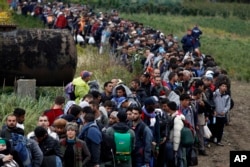The U.N. refugee agency reports the number of refugees and migrants who have arrived in Greece by sea this year soon will top 400,000. The UNHCR says the total number of Mediterranean sea-crossings this year stands at well over one-half million and is continuing to climb.
The U.N. refugee agency reports an overwhelming number of refugees and migrants crossing the Mediterranean from Turkey are arriving in Greece, followed by Italy with 131,000 people arriving so far this year.
The agency says a record 168,000 people made the perilous sea crossing in September. That is the highest monthly figure this year and almost five times the number in September 2014.
Bad weather
The United Nations refugee agency — UNHCR — reports a "noticeable drop" this week in the number of migrants arriving in Greece.
On Friday, officials blamed bad weather in the Mediterranean Sea for slowing the pace of arrivals. However, the downturn is not expected to last.
U.N. refugee agency spokesman Adrian Edwards said "any improvement in the weather is likely to bring another surge in arrivals."
"Windy autumn weather did affect sea crossings this week. Refugee and migrant arrivals in Greece have nonetheless continued to rise. They are expected to reach the 400,000 mark there, probably over the week-end," he said.
More dinghies carrying refugees and migrants arrived Friday in the Greek island of Lesbos from the Turkish coast, many of them Syrians fleeing civil war. The new group included distressed woman and children, shaking with cold after a perilous journey across the Mediterranean Sea.
The UNHCR says 97 percent of all those fleeing to Europe by sea are from the world’s top 10 refugee-producing countries, led by Syria, Afghanistan and Iraq. It rejects the perception that they are economic migrants in search of a better life.
Although, only 1,500 migrants arrived Thursday in Greece, in comparison to the recent average of 5,000 arriving daily, 400,000 people made the risky trip by boat to Greece this year out of about 520,000 total who have reached Europe via the Mediterranean.
UNHCR said Thursday that it expects 700,000 migrants and refugees will reach Europe via the Mediterranean this year, and projected that approximately the same number will arrive in 2016.
That number is double the agency's original estimate. The UNHCR also appealed for $128 million in donations to cope with the crisis, a much higher target than the $30.5 million it requested last month.
Positive steps
The agency says reception centers that can quickly assist, process, and screen the people arriving by sea must be urgently established. UNHCR spokesman Adrian Edwards told VOA that Europe has taken some positive steps in efforts to stabilize this crisis.
He said European countries have made progress in increasing search and rescue capacity in the Mediterranean. They have announced a program for relocating 120,000 refugees among EU countries and have increased funding. But he said this is not enough to tackle this critical situation.
Much to be done
“Although public attention has moved away this week from Europe’s refugee emergency, it is very clear this is a continuing, very large-scale emergency that is underway," he said. "People are moving through all these countries en route and many of the problems still have to be addressed. There has to be a proper, united approach to all levels of managing this crisis and there are lots more work still to be done. In addition to that, the factors driving these flows are not going away.”
In light of the fast-evolving situation in Europe, the UNHCR has revised its appeal for the so-called Special Mediterranean Initiative. This action plan aims to assist refugees arriving in Europe from the Middle East, West and East Africa. The agency is asking for $128 million from June 2015 to December 2016.
Olympic venue housing
Meanwhile, Greek authorities have opened a disused Olympic venue to house more than 400 migrants who have been camping out in Athens' Victoria Square.
Police on Thursday escorted buses carrying the migrants, many from Syria and Afghanistan, to Galatsi Olympic Hall. The venue was home to table tennis and gymnastics competitions during the 2004 Olympics.
City officials have been trying to ease citizens' concerns about the number of migrants camping out in the open in central Athens. Greece is on the front lines of the European migrant crisis and has been overwhelmed with people who travel across the Mediterranean Sea from the Middle East and Africa to seek better lives in the European Union.
UN General Assembly
At the U.N. General Assembly in New York Wednesday, Secretary- General Ban Ki-moon appealed to the world to approach Europe's refugee crisis with "creativity, compassion, and courage."
Ban told meeting of 70 ministers at the General Assembly that "the future does not belong to those who seek to build walls or exploit fears."
He stressed cooperation among all those who are struggling to cope with the crisis, with all efforts focused on saving lives. Otherwise, Ban said "the winners will be smugglers, traffickers and unscrupulous employers. Those who lose will be the dispossessed, the hungry, the vulnerable, the defenseless, and the children."






